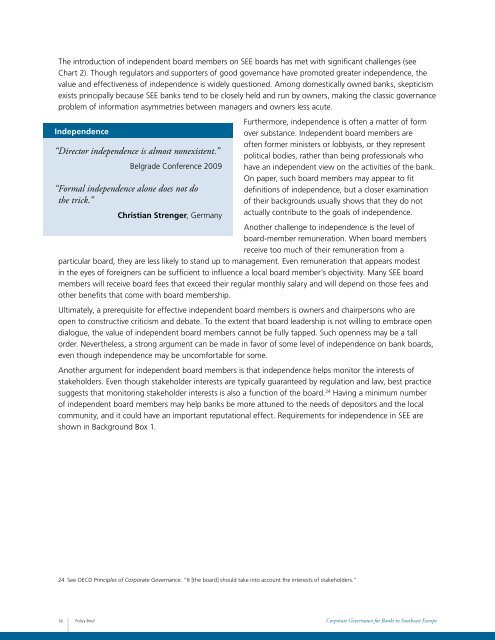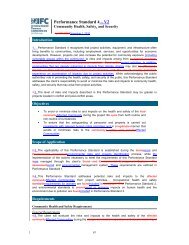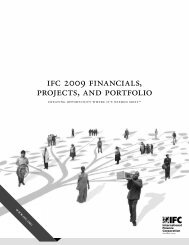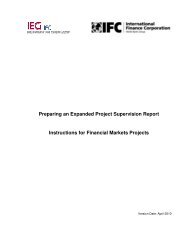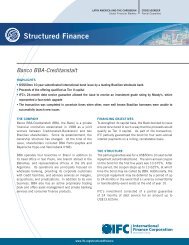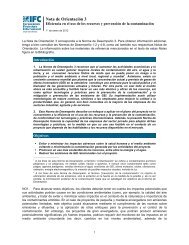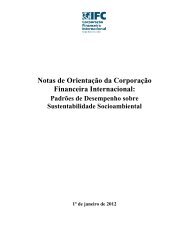Corporate Governance for Banks in Southeast Europe: Policy - IFC
Corporate Governance for Banks in Southeast Europe: Policy - IFC
Corporate Governance for Banks in Southeast Europe: Policy - IFC
Create successful ePaper yourself
Turn your PDF publications into a flip-book with our unique Google optimized e-Paper software.
The <strong>in</strong>troduction of <strong>in</strong>dependent board members on SEE boards has met with significant challenges (see<br />
Chart 2). Though regulators and supporters of good governance have promoted greater <strong>in</strong>dependence, the<br />
value and effectiveness of <strong>in</strong>dependence is widely questioned. Among domestically owned banks, skepticism<br />
exists pr<strong>in</strong>cipally because SEE banks tend to be closely held and run by owners, mak<strong>in</strong>g the classic governance<br />
problem of <strong>in</strong><strong>for</strong>mation asymmetries between managers and owners less acute.<br />
Independence<br />
“Director <strong>in</strong>dependence is almost nonexistent.”<br />
Belgrade Conference 2009<br />
“Formal <strong>in</strong>dependence alone does not do<br />
the trick.”<br />
Christian Strenger, Germany<br />
Furthermore, <strong>in</strong>dependence is often a matter of <strong>for</strong>m<br />
over substance. Independent board members are<br />
often <strong>for</strong>mer m<strong>in</strong>isters or lobbyists, or they represent<br />
political bodies, rather than be<strong>in</strong>g professionals who<br />
have an <strong>in</strong>dependent view on the activities of the bank.<br />
On paper, such board members may appear to fit<br />
def<strong>in</strong>itions of <strong>in</strong>dependence, but a closer exam<strong>in</strong>ation<br />
of their backgrounds usually shows that they do not<br />
actually contribute to the goals of <strong>in</strong>dependence.<br />
Another challenge to <strong>in</strong>dependence is the level of<br />
board-member remuneration. When board members<br />
receive too much of their remuneration from a<br />
particular board, they are less likely to stand up to management. Even remuneration that appears modest<br />
<strong>in</strong> the eyes of <strong>for</strong>eigners can be sufficient to <strong>in</strong>fluence a local board member’s objectivity. Many SEE board<br />
members will receive board fees that exceed their regular monthly salary and will depend on those fees and<br />
other benefits that come with board membership.<br />
Ultimately, a prerequisite <strong>for</strong> effective <strong>in</strong>dependent board members is owners and chairpersons who are<br />
open to constructive criticism and debate. To the extent that board leadership is not will<strong>in</strong>g to embrace open<br />
dialogue, the value of <strong>in</strong>dependent board members cannot be fully tapped. Such openness may be a tall<br />
order. Nevertheless, a strong argument can be made <strong>in</strong> favor of some level of <strong>in</strong>dependence on bank boards,<br />
even though <strong>in</strong>dependence may be uncom<strong>for</strong>table <strong>for</strong> some.<br />
Another argument <strong>for</strong> <strong>in</strong>dependent board members is that <strong>in</strong>dependence helps monitor the <strong>in</strong>terests of<br />
stakeholders. Even though stakeholder <strong>in</strong>terests are typically guaranteed by regulation and law, best practice<br />
suggests that monitor<strong>in</strong>g stakeholder <strong>in</strong>terests is also a function of the board. 24 Hav<strong>in</strong>g a m<strong>in</strong>imum number<br />
of <strong>in</strong>dependent board members may help banks be more attuned to the needs of depositors and the local<br />
community, and it could have an important reputational effect. Requirements <strong>for</strong> <strong>in</strong>dependence <strong>in</strong> SEE are<br />
shown <strong>in</strong> Background Box 1.<br />
24 See OECD Pr<strong>in</strong>ciples of <strong>Corporate</strong> <strong>Governance</strong>. “It [the board] should take <strong>in</strong>to account the <strong>in</strong>terests of stakeholders.”<br />
18<br />
<strong>Policy</strong> Brief<br />
<strong>Corporate</strong> <strong>Governance</strong> <strong>for</strong> <strong>Banks</strong> <strong>in</strong> <strong>Southeast</strong> <strong>Europe</strong>


